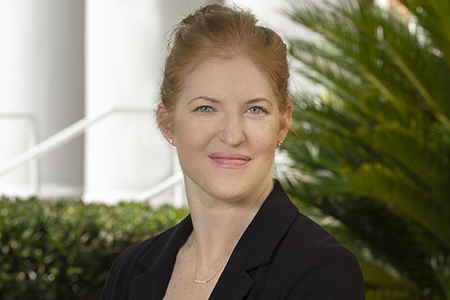Q&A with Professor Sarah Swan

What made you decide to become a law professor?
When I was in high school, I wanted to be one of three things: a lawyer, an English literature professor, or a forensic psychologist. Being a law professor lets me incorporate elements of all three! I get to engage in deep textual analysis, teach, and explore how we conceptualize and understand wrongdoing.
Please explain your area of expertise and why you chose to specialize in that area.
I focus on third-party responsibility – moments where we hold someone accountable, either directly or indirectly, for someone else’s wrongdoing. For example, I’ve written about institutional and corporate responsibility for facilitating or failing to prevent sexual assault. I’ve also written about local ordinances which allow entire families to be evicted for one person’s alleged wrongdoing. Third-party responsibility is an incredibly powerful lever, and I worry that we actually have a tendency to use it in a heavy-handed way against individuals who may have little actual control over the actions of others, while soft-pedaling it when it comes to the institutions and corporations that do have control over the actions of others and yet enable or facilitate heinous conduct.
Why did you join the law faculty at Florida State?
It’s no secret in the law teaching community that Florida State has a terrific, scholarly faculty. It felt like a place where I could develop my scholarly skill set while being simultaneously challenged and supported. I was also impressed with FSU’s commitment to diversity and ensuring access to legal education. Even though I wanted to be a lawyer when I was in high school, I had only ever seen them on TV – programs like the Donald J. Weidner Summer for Undergraduates Program let students see the path to making those kinds of aspirations turn into reality.
How do you bring your scholarship/research into the classroom?
I teach a Contemporary Topics in Tort Law Seminar that explores many current instances where we consider imposing liability on third parties, from parental liability for children who commit mass school shootings, to teens who text other teens knowing that the recipient is driving, to government liability for police misconduct.
If you weren’t teaching, what do you think you would be doing?
I’d be a writer of some kind – probably a journalist writing on legal issues. I have deep admiration for people like Jill Lepore and Rebecca Traister who are able to translate complex legal and social issues into writing that resonates with a hugely broad audience.
What do you like to do in your spare time?
Spare time? Ha! I have a three year old and a six year old.
What accomplishment are you most proud of? Why?
As part of a fundraiser when I was a practicing attorney, I participated in a Survivor-style competition on a small, isolated island in Canada. I won!
Is there anything else you’d like alumni to know about you?
One area that I’m always intrigued by is the interactions between law and popular culture. The vast majority of the public really gathers most of what they know about law from television shows and movies and podcasts. I’ve co-authored probably close to a dozen chapters on law and popular culture with a former professor of mine – which was a really good excuse to watch a whole lot of tv! One of our favorite things to write about was themes of law and justice on Buffy the Vampire Slayer.
As printed in the 2019 issue of Florida State Law magazine.

